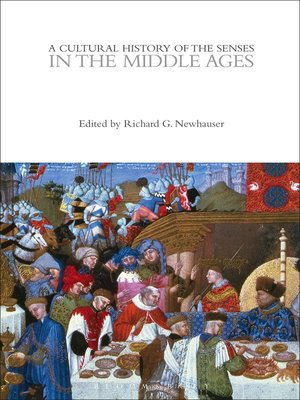A Cultural History of the Senses in the Middle Ages
ebook ∣ The Cultural Histories Series
By Richard G. Newhauser

Sign up to save your library
With an OverDrive account, you can save your favorite libraries for at-a-glance information about availability. Find out more about OverDrive accounts.
Find this title in Libby, the library reading app by OverDrive.



Search for a digital library with this title
Title found at these libraries:
| Library Name | Distance |
|---|---|
| Loading... |
Understanding the senses is indispensable for comprehending the Middle Ages because both a theoretical and a practical involvement with the senses played a central role in the development of ideology and cultural practice in this period. For the long medieval millennium, the senses were not limited to the five we think of: speech, for example, was categorized among the senses of the mouth. And sight and hearing were not always the dominant senses: for the medical profession, taste was more decisive. Nor were the senses only passive receptors: they were understood to play an active role in the process of perception and were also a vital element in the formation of each individual's moral identity.
From the development of specifically urban or commercial sensations to the sensory regimes of holiness, from the senses as indicators of social status revealed in food to the Scholastic analysis of perception, this volume demonstrates the importance of sensory experience and its manifold interpretations in the Middle Ages.
A Cultural History of the Senses in the Middle Ages presents essays on the following topics: the social life of the senses; urban sensations; the senses in the marketplace; the senses in religion; the senses in philosophy and science; medicine and the senses; the senses in literature; art and the senses; and sensory media.
From the development of specifically urban or commercial sensations to the sensory regimes of holiness, from the senses as indicators of social status revealed in food to the Scholastic analysis of perception, this volume demonstrates the importance of sensory experience and its manifold interpretations in the Middle Ages.
A Cultural History of the Senses in the Middle Ages presents essays on the following topics: the social life of the senses; urban sensations; the senses in the marketplace; the senses in religion; the senses in philosophy and science; medicine and the senses; the senses in literature; art and the senses; and sensory media.







